Unlocking the Potential of Methyl Hydroxyethyl Cellulose (MHEC) in Various Applications
Methyl Hydroxyethyl Cellulose is a cellulose derivative that is synthesized through the controlled modification of natural Cellulose ether. This results in a compound with exceptional properties, including solubility in both cold and hot water, high viscosity, and excellent film-forming abilities. The controlled methylation and hydroxyethylation processes lead to a compound with tailorable characteristics, making it a valuable asset in a wide range of applications.

Properties that Set MHEC Apart
Solubility and Stability
Methyl Hydroxyethyl Cellulose (MHEC) exhibits remarkable solubility in water across various temperatures, making it an ideal candidate for applications that require consistent viscosity and dispersion properties. Its stability in different environments ensures that the desired functionalities are retained, contributing to the reliability of end products.
Thickening and Viscosity Control
One of the standout features of MHEC is its ability to act as a highly effective thickening agent in both aqueous and non-aqueous systems. Its viscosity-controlling properties empower manufacturers to achieve the desired texture, consistency, and flow characteristics in products such as paints, coatings, and adhesives.
Film Formation and Surface Modification
MHEC's film-forming capabilities make it an invaluable ingredient in applications that require the creation of protective or decorative coatings. Its ability to adhere to surfaces, along with its film flexibility and durability, makes it a favored choice in the construction industry for products like plasters and tile adhesives.
Controlled Release
The controlled release of active ingredients is a crucial aspect in pharmaceuticals, agriculture, and personal care products. MHEC's ability to encapsulate and gradually release substances adds a new dimension to these sectors, ensuring precise dosage and extended effectiveness.
Applications Across Industries
1. Construction and Building Materials
In the construction industry, MHEC finds extensive use in formulations of cement-based products. It enhances workability, water retention, and adhesive properties of mortars and renders. MHEC-modified products result in improved cohesion, reduced cracking, and enhanced durability of structures.
2. Paints, Coatings, and Adhesives
MHEC's thickening and stabilizing properties make it a cornerstone in the formulation of paints, coatings, and adhesives. It ensures even pigment distribution, prevents settling, and contributes to the overall quality and longevity of the final product.
3. Pharmaceuticals and Personal Care
The controlled release capabilities of MHEC are harnessed in pharmaceuticals and personal care products. From extended-release tablets to skin care formulations, MHEC's role in gradual substance release enhances efficacy and consumer experience.
4. Food and Beverages
In the food and beverage industry, MHEC finds its way into applications that require emulsification, thickening, and stabilization. It is often utilized in products such as dairy items, sauces, and dressings, contributing to improved texture and shelf life.
Conclusion
In the grand tapestry of modern chemical advancements, Methyl Hydroxyethyl Cellulose (MHEC) stands as a versatile and essential component that has redefined possibilities across industries. Its exceptional properties, including solubility, viscosity control, film formation, and controlled release, have made it a go-to choice for manufacturers and innovators. From construction and coatings to pharmaceuticals and food, MHEC continues to shape the landscape of various sectors. As technology evolves and industries continue to innovate, the potential applications of MHEC are poised to expand further, contributing to progress and innovation on a global scale.
- Previous: What are the uses of bleaching powder?
- Next: What Is A Graphite Electrode?

